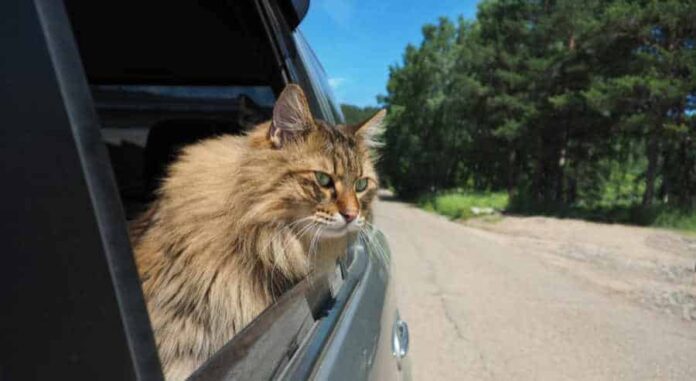Motion sickness in cats is a common concern among pet owners, and many wonder: can cats die from motion sickness? While motion sickness itself isn’t typically fatal, it can lead to severe dehydration and stress if not properly managed, which could potentially become dangerous for your feline friend.
Understanding Feline Motion Sickness
Motion sickness in cats occurs when there’s a disconnect between what your cat’s eyes see and what their inner ear’s balance system experiences. Just like humans our furry friends can get queasy during car rides or other forms of travel. If you’re interested in learning more about various dog-related topics check out our comprehensive guide on dog care and health.
Common Symptoms of Motion Sickness in Cats
- Excessive drooling
- Vomiting
- Lethargy
- Whining or meowing
- Urination or defecation outside the litter box
- Lip licking
- Excessive swallowing
Health Risks Associated with Motion Sickness
While cats rarely die directly from motion sickness, the condition can lead to several health complications:
- Dehydration
- Loss of fluids through vomiting
- Decreased appetite
- Electrolyte imbalance
- Stress-Related Issues
- Weakened immune system
- Behavioral problems
- Anxiety disorders
Prevention and Treatment Options
As recommended by Pet like boss, here are some effective ways to manage your cat’s motion sickness:
Before Travel
- Withhold food 4-6 hours before travel
- Use a well-ventilated carrier
- Place familiar bedding in the carrier
- Consider anti-nausea medications (prescribed by a vet)
During Travel
- Maintain proper temperature
- Minimize sudden movements
- Take regular breaks
- Provide reassurance and comfort
Natural Remedies and Solutions
Some pet parents have found success with these natural approaches:
- Calming Aids
- Pheromone sprays
- Herbal supplements
- Compression garments
- Environmental Modifications
- Playing soft music
- Using sun shields
- Positioning the carrier for optimal viewing
When to Seek Veterinary Care
While motion sickness isn’t usually fatal, you should contact your vet if:- Vomiting persists for more than 24 hours- Signs of severe dehydration appear- Your cat refuses food or water- Unusual behavioral changes occur
Tips for Long-Distance Travel
- Preparation
- Get your cat accustomed to their carrier
- Plan frequent stops
- Pack emergency supplies
- During the Journey
- Monitor your cat’s condition
- Maintain good ventilation
- Keep noise levels low
Medication Options
Your veterinarian might recommend 1. Anti-nausea medications2. Anti-anxiety medications3 Motion sickness specific treatments
Preventing Future Episodes
To minimize motion sickness in future travels 1 Start with short trips2, Create positive associations3 Use proper restraint methods4, Maintain consistent feeding schedules
The Role of Stress and Anxiety
Stress can worsen motion sickness symptoms. Consider these factors:- Previous travel experiences- Environmental changes- Your own stress levels
Long-term Management Strategies
- Behavioral Training
- Desensitization exercises
- Positive reinforcement
- Gradual exposure to travel
- Environmental Modifications
- Choose appropriate travel times
- Select optimal routes
- Create a comfortable travel space
Understanding Your Cat’s Individual Needs
Each cat responds differently to motion sickness. Factors to consider:- Age- Overall health- Previous experiences- Individual temperament
While cats typically don’t die from motion sickness directly, it’s essential to take the condition seriously and manage it appropriately. With proper preparation, medication when necessary, and attention to your cat’s needs, you can help make travel more comfortable for your feline companion.
Remember to:- Monitor symptoms closely- Maintain hydration- Consult your vet when needed- Plan ahead for trips- Stay patient during the adjustment period
By following these guidelines and working closely with your veterinarian, you can help ensure your cat’s safety and comfort during travel, preventing any serious complications from motion sickness.







![Can Dogs Have Surimi? The Truth About Feeding Imitation Crab to Your Furry Friend Can Dogs Eat Imitation Crab? [MUST KNOW FACTS!!]](https://petlikeboss.com/wp-content/uploads/2024/11/Can-Dogs-Eat-Sushi-Rice-2-100x70.jpg)

